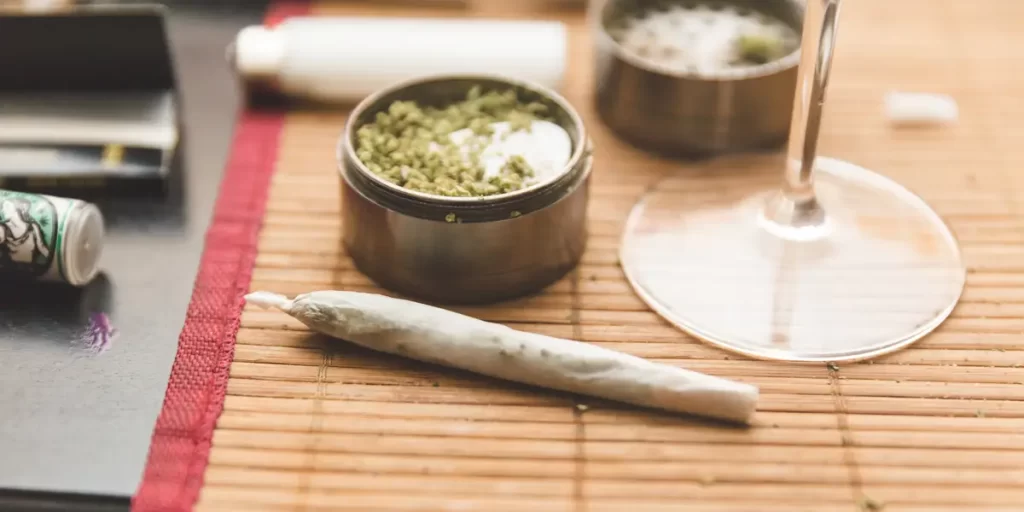Mixing Marijuana and Alcohol – Are there dangers?
Written by Renee Deveney
& Medically Reviewed by Dr. Bonnie Bullock, PHD
Medically Reviewed
Up to Date
Last Updated - 6/17/2022
View our editorial policy
As more states legalize marijuana, its use in combination with other drugs like alcohol is also likely to increase. Even before marijuana was legalized, it was commonplace for individuals to mix marijuana and alcohol, particularly among party-goers. Although marijuana and alcoholism are not mutually exclusive, mixing these drugs is associated with certain risks and side effects. Individuals should be aware of how using marijuana may impact alcohol use and vise versa.
How Marijuana and Alcohol Interact
Currently, there is very little research on the direct interactions between marijuana and alcohol. However, a few studies suggest that drinking alcohol, regardless of the quantity, increases THC levels in the blood.
Marijuana and alcohol can act in different ways. Active ingredients in marijuana bind to cannabinoid receptors in the brain, whereas alcohol works through two different receptors in the brain known as GABA or NMDA receptors. Both drugs are central nervous system (CNS) depressants, meaning that they have a sedative effect on the body. Because of this sedative impact, their singular effects may synergize or be magnified if used in combination. Importantly, different strains of marijuana (e.g., indicas, sativas or hybrids of the two) are capable of inducing very different effects — some calming, some anxiety-provoking. Everyone reacts to alcohol and marijuana differently, with the added complication of different strains of marijuana and THC levels.
Side Effects of Mixing Marijuana and Alcohol
What are the typical side effects associated with mixing marijuana and alcohol? Side effects will be different for everyone depending on the individual, the amount of alcohol consumed, the quantity, the type of marijuana and the way it is used (smoking or edibles). Smoking very high potency marijuana, eating marijuana edibles or smoking marijuana extract (e.g., dabbing) can bring about even more intense side effects when combined with alcohol.
It is impossible to predict the individual side effects of mixing marijuana and alcohol. Even people who tolerate marijuana and alcohol well on their own may experience uncomfortable moments when the substances are combined. Typical side effects associated with mixing these two drugs include:
- Feeling panicked
- Lack of concentration
- Panic attacks
- Difficulty breathing
- Dizziness
- Feeling scared or out of control
- Paranoia
- Memory problems
- Coughing fits
- Feeling disconnected from your body or thoughts (e.g., depersonalization, derealization)
Risks of Mixing Marijuana and Alcohol
There are a few different risks associated with using marijuana and alcohol together. The effects of both may be exacerbated if used in combination. The marijuana high can feel even more intense and worrisome, particularly if a person is not used to smoking marijuana. Because alcohol can increase THC levels in the blood, there is potential that individuals will experience a psychotic episode while drinking due to the high levels of THC in their system at this time.
Additionally, when a person drinks too much, the natural response from the body is to rid itself of excess alcohol through vomiting. Marijuana has the opposite effect and can reduce a person’s ability to vomit. Generally speaking, marijuana use is not life-threatening, except when combined with other substances. For example, if a person has consumed excessive amounts of alcohol, consuming marijuana may lead to further incapacitation and inability to function in the event of an emergency.
What Is “Greening Out”
In recent years, a term known as “greening out” or “whiting out” has entered the modern lexicon. Symptoms may be comparable to “blacking out” with alcohol alone. Greening or whiting out can be used interchangeably to describe bad reactions to smoking or ingesting some form of marijuana. Symptoms of a person greening out include:
- Feeling sick after smoking marijuana
- Pale skin
- Sweating or clammy skin
- Feelings of panic or full-on panic attacks
- Anxiety
- Dizziness
- Nausea
- Vomiting
- Hallucinations (rare)
These symptoms may look like an overdose of marijuana, though they are generally not life-threatening unless marijuana is used in combination with other substances like alcohol. However, it is possible for greening out to happen just from marijuana use alone.
Marijuana and Alcohol Addiction
Individuals may become addicted to marijuana, alcohol or both drugs. Marijuana and alcohol addiction can impact a person’s ability to function in everyday life. As with any drug, there is potential for addiction when individuals either experience withdrawal behaviors or physical symptoms associated with not using the drug. Excessive marijuana and alcohol use can affect the brain’s ability to regulate and produce neurotransmitters over time. More research must be conducted on concurrent marijuana and alcohol addiction and whether one increases the risk for another.
Marijuana and Alcohol Withdrawal
Symptoms of marijuana and alcohol withdrawal may be very similar to each drug alone or quite different depending on the person. Generally, withdrawal symptoms include:
- Being irritable or moody
- Changes in sleep
- Difficulty falling or staying asleep (insomnia)
- Changes in appetite
- Severe cravings for the drug
- Inability to sit still
- Physical ailments
When a person withdraws from both alcohol and marijuana, they may have cravings for both drugs. Individuals may rely more heavily on one drug while they try to quit the other, which can lead to a dangerous cycle.
Getting Help for Marijuana and Alcohol Addiction
Marijuana addiction treatment involves receiving support and medical care for addiction. For example, individuals may choose to get help for co-occurring alcohol addiction, attend community addiction or support groups, receive treatment at an inpatient or outpatient addiction facility or receive cognitive behavioral therapy.
Contact The Recovery Village Ridgefield today if you or a loved one are struggling with a marijuana or alcohol addiction. A representative will be happy to discuss treatment options and care for co-occurring marijuana and alcohol addiction.
Sources
American Association for Clinical Chemistry. “Any dose of alcohol combined with cannabis significantly increases levels of THC in blood.” ScienceDaily, May 27, 2015. Accessed August 16, 2019.
Drug and Alcohol Research and Training Australia (DARTA). “How do you look after someone who is ‘greening out’ on cannabis?” December 2014. Accessed August 16, 2019.
Garber-Paul, Elisabeth. “United States of Weed.” RollingStone Magazine, June 17, 2019. Accessed August 16, 2019.
National Institute on Drug Abuse. “Is marijuana addictive?” July 2019. Accessed August 16, 2019.
Valenzuela, C. Fernando. “Alcohol and Neurotransmitter Interactions.” Alcohol Health & Research, 1997. Accessed August 16, 2019.
View Sources
American Association for Clinical Chemistry. “Any dose of alcohol combined with cannabis significantly increases levels of THC in blood.” ScienceDaily, May 27, 2015. Accessed August 16, 2019.
Drug and Alcohol Research and Training Australia (DARTA). “How do you look after someone who is ‘greening out’ on cannabis?” December 2014. Accessed August 16, 2019.
Garber-Paul, Elisabeth. “United States of Weed.” RollingStone Magazine, June 17, 2019. Accessed August 16, 2019.
National Institute on Drug Abuse. “Is marijuana addictive?” July 2019. Accessed August 16, 2019.
Valenzuela, C. Fernando. “Alcohol and Neurotransmitter Interactions.” Alcohol Health & Research, 1997. Accessed August 16, 2019.
Authorship



